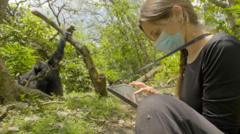In the rolling hills of southwestern Virginia, the future of a long-standing forest economy is taking root as local farmers join forces to reestablish a thriving market for herbal supplements and remedies deeply embedded in Appalachian culture. Under the leadership of individuals like Dr. Ryan Huish, a biology professor at the University of Virginia’s College at Wise, efforts are underway to build a sustainable framework for these time-honored practices, ensuring they also yield economic benefits for the community.
Dr. Huish, who has cultivated a vibrant medicinal herb garden on his family’s 60-acre property in Duffield, actively engages students in exploring edible plant life found in nearby forests. These include a variety of traditional meats such as ramps and Appalachian wasabi, which have played significant roles in the dietary and medicinal traditions of the area for centuries. Local expert Katie Commender, director of the Appalachian Harvest Herb Hub, emphasizes the importance of passing this knowledge to younger generations amid concerns that traditional practices are waning.
For over 300 years, the Appalachian Mountains have provided a rich source of botanicals, but unregulated markets have often resulted in overharvesting and diminishing returns for local farmers. By focusing on sustainable practices and proper market regulation, community initiatives aim to breathe new life into the herb economy while maintaining the legacy of Appalachian culture.
Commender reports that many local ginseng and root dealers fear the loss of traditional knowledge, highlighting the importance of education and engagement in the renewal of these practices. As the region navigates the intersection of tradition and modernity, the call to action for community members is loud and clear: to preserve the cultural heritage while adopting sustainable farming practices that ensure a prosperous future for all involved. With ongoing support from collaborative efforts and local organizations, Virginia's forest economy is poised for a renaissance rooted in respect for the land and its history.





















